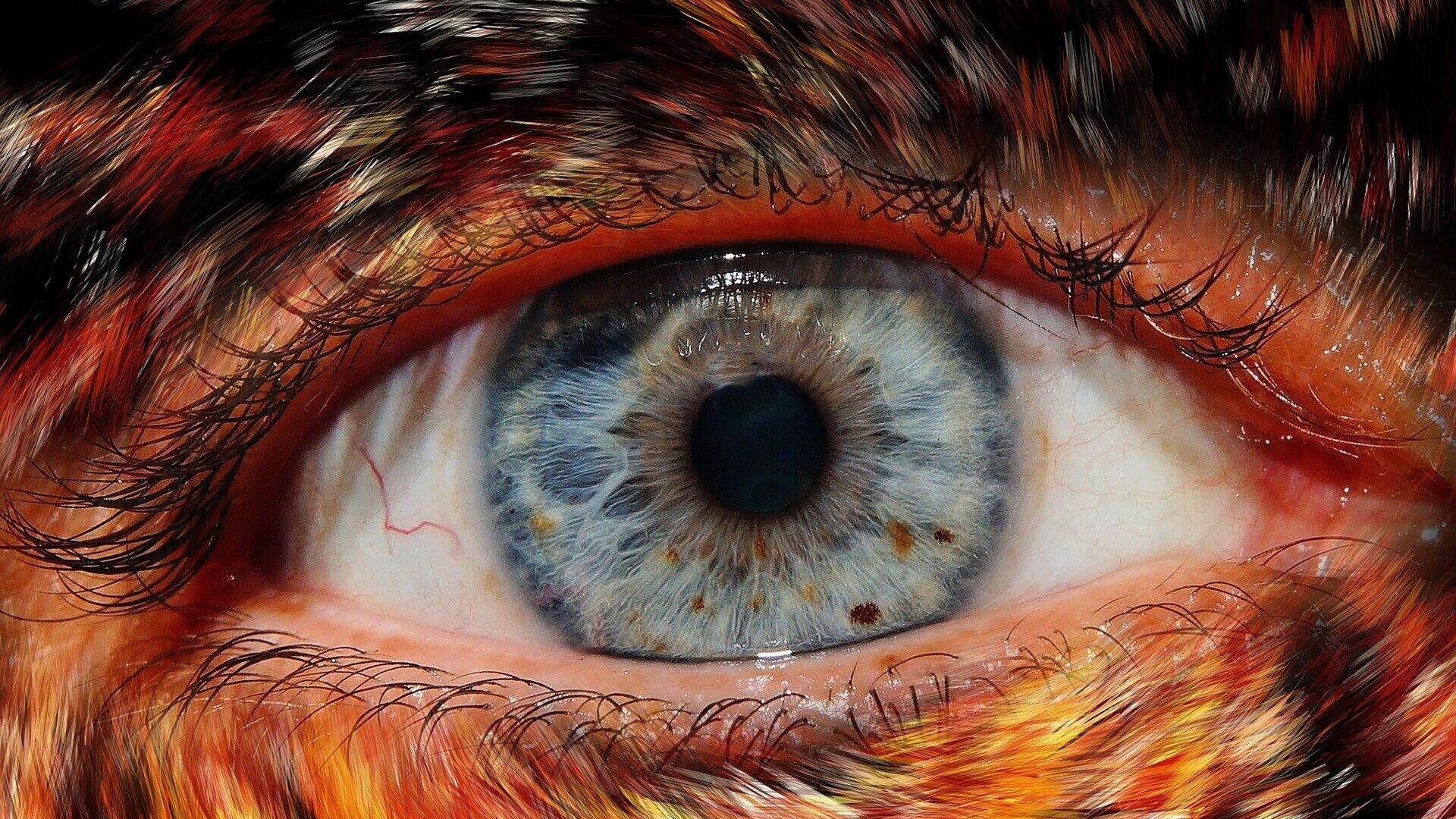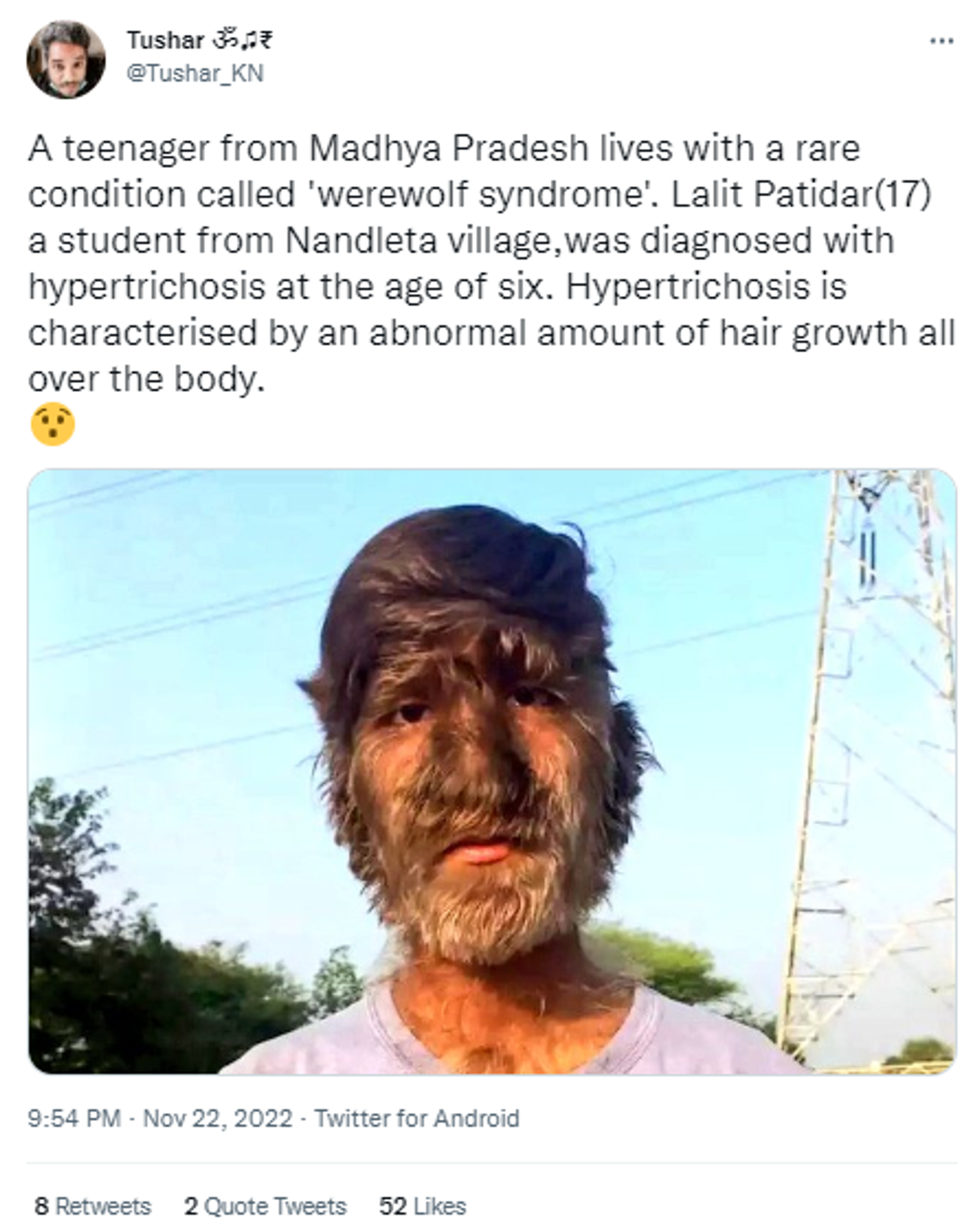https://sputnikglobe.com/20221123/werewolf-syndrome-indian-teen-diagnosed-with-extremely-rare-disorder-1104575305.html
Werewolf Syndrome: Indian Teen Diagnosed With Extremely Rare Disorder
Werewolf Syndrome: Indian Teen Diagnosed With Extremely Rare Disorder
Sputnik International
Only around 50 people have reported having the incurable hairy disorder since the Middle Ages. 23.11.2022, Sputnik International
2022-11-23T11:21+0000
2022-11-23T11:21+0000
2022-11-23T12:08+0000
india
rare
syndrome
condition
medical condition
hair
growth
cure
monkey
disease
https://cdn1.img.sputnikglobe.com/img/07e5/0b/0c/1090686444_0:180:1920:1260_1920x0_80_0_0_938ae11eb27526b87a9b426922399364.jpg
With hair all over his body, an Indian boy has been living with 'werewolf syndrome' since he was diagnosed with hypertrichosis when six.Lalit Patidar, 17, from Nandleta village of India's Madhya Pradesh state, was first diagnosed with this rare disorder after he noticed a huge amount of hair growing all over his body, unlike his friends. There was no history of such hair growth conditions in his family.His parents took him to the doctor who revealed his unusual medical condition, also known as hypertrichosis. Only 50 people in the world have been affected by this. According to Patidar, some children at school used to be scared of him, thinking that he would bite them like an animal, while others mocked him by calling him "monkey man".Patidar, however, who belongs to a middle-class family of farmers, doesn't feel upset about his rare condition. Instead, he views himself as unique and one-in-a-million. Since there is no cure for his condition, Patidar's parents worry a lot about him and his future.
Sputnik International
feedback@sputniknews.com
+74956456601
MIA „Rossiya Segodnya“
2022
Sangeeta Yadav
https://cdn1.img.sputnikglobe.com/img/07e4/08/1b/1080292803_0:121:960:1081_100x100_80_0_0_7490b319dab9611e309056b177265184.jpg
Sangeeta Yadav
https://cdn1.img.sputnikglobe.com/img/07e4/08/1b/1080292803_0:121:960:1081_100x100_80_0_0_7490b319dab9611e309056b177265184.jpg
News
en_EN
Sputnik International
feedback@sputniknews.com
+74956456601
MIA „Rossiya Segodnya“
Sputnik International
feedback@sputniknews.com
+74956456601
MIA „Rossiya Segodnya“
Sangeeta Yadav
https://cdn1.img.sputnikglobe.com/img/07e4/08/1b/1080292803_0:121:960:1081_100x100_80_0_0_7490b319dab9611e309056b177265184.jpg
werewolf syndrome, what is werewolf syndrome?, all you need to know about werewolf syndrome, rare disorder, rare condition, abnormal growth of hair all over body, lalit patidar, monkey man, diagnosed, hypertrichosis,
werewolf syndrome, what is werewolf syndrome?, all you need to know about werewolf syndrome, rare disorder, rare condition, abnormal growth of hair all over body, lalit patidar, monkey man, diagnosed, hypertrichosis,
Werewolf Syndrome: Indian Teen Diagnosed With Extremely Rare Disorder
11:21 GMT 23.11.2022 (Updated: 12:08 GMT 23.11.2022) Only around 50 people have reported having the incurable hairy disorder since the Middle Ages.
With hair all over his body, an Indian boy has been living with 'werewolf syndrome' since he was diagnosed with hypertrichosis when six.
Lalit Patidar, 17, from Nandleta village of India's Madhya Pradesh state, was first diagnosed with this rare disorder after he noticed a huge amount of hair growing all over his body, unlike his friends. There was no history of such hair growth conditions in his family.
His parents took him to the doctor who revealed his unusual medical condition, also known as hypertrichosis. Only 50 people in the world have been affected by this.
According to Patidar, some children at school used to be scared of him, thinking that he would bite them like an animal, while others mocked him by calling him "monkey man".
Patidar, however, who belongs to a middle-class family of farmers, doesn't feel upset about his rare condition. Instead, he views himself as unique and one-in-a-million.
"I learned many things during my journey, most importantly I got to learn that I am one-in-a-million, I should never give up, and live life to the fullest I always want to move forward and be happy. I am different, but most of the time our differences are our greatest strengths, and I am proud to be me," Patidar told Indian media.
Since there is no cure for his condition, Patidar's parents worry a lot about him and his future.



